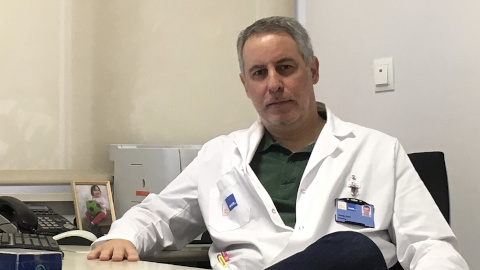Bilingualism, probable protective factor in Alzheimer's disease

Speaking two or more languages may be a probable protective factor against Alzheimer's and could contribute to delaying the onset of symptoms 4.5 years, according to a study published in the journal Revista de Neurología and conducted by a research team from the Hospital del Mar, the UAB and the Hospital Quirónsalud in Sabadell.
18/11/2020
Speaking two or more languages may be a probable protective factor in relation to Alzheimer's disease, and could work in preventing or delaying symptoms. These are the findings of a study recently published in the journal Revista de Neurología, led by Dr Josep Deví of the EAIA in Cognitive Disorders and the primary healthcare centre CAS de Santa Coloma de Gramenet (CAEMIL) of the Institute of Neuropsychiatry and Addictions (INAD) at the Hospital del Mar,and lecturer of the Department of Clinical Psychology and Health at the Universitat Autònoma de Barcelona (UAB). Also working on the study were Noemí Català, psychologist from the Department of Clinical Psychology and Health at the UAB and Susanna Jofre, nurse from the Emergency Care Unit of the Hospital Quirónsalud in Sabadell.
The study consisted in the systematic review of the most rigorous methodological studies published until now on this suject at an international scale. Ten studies were selected and, of these, seven highlighted a direct relation between bilingualism or plurilingualism and a delay in the onset of clinical symptoms or a slowdown in the rate of progression. Other two studies found a partial relation, only in cases of lower education levels or when more than two languages were spoken. And only one study showed no significant relation between speaking various languages and a delay in disease onset.
“The conclusion is that in general we find a delay in the diagnosis or appearance of symptoms related to Alzheimer's disease ranginga from 4.5 to 7 years”, explains Dr Deví. This is due to the fact that speaking two or more languages increases the cognitive reserve of an individual, i.e., a person's capacity to resist the deterioration of the brain without presenting symptoms or showing less symptoms that would be expected deoending on the neuropathology present at that moment. At hte same time, “there are specific brain structures”, the mian author of the study explains, “that, when affected by the disease, have their functions taken over by other regions of the brain, even if they are not their main functions”.
Neuroimaging Techniques
Some of the studies analysed used neuroimaging techniques to analyse the brains of patients. One of these tests allow researchers to verigy how people speaking two or more languages increase their cognitive research, improving in executive control tasks, and thus improving their working memory and exchange tasks. In fact, these tests helped to determine that these people presented a very severe neuropathological deterioration in several regions of the braing and, nevertheless, obtained better results than monolingual speakers in many of the tests. This has led the authors to point to the existence of strategies or compensatory networks which allow them to obtain better results despite the neuropathology from which they suffer.
“With regard to the anatomical regions of the brain, language is located in the left hemisphere. Hoiwever, the use of two languages in everyday situations implies a reorganisation of the brain's structure and functionality. For example, several neuroimaging studies have observed that, during interference suppression tasks, bilinguals activated different frontal-temporal and subcortical regions and connections, while monolinguals did not activate them. In addition, it is worth mentioning that other recent studies have demonstrated that people categorised as bilinguals score higher in tasks measuring executive tasks. These results may be due to the fact that a constant use of two languages imrpoves attention and cognitive control aspects”, says Dr Deví. “This allows bilinguals and multilinguals to increase their cognitive reserves and their ability to be resilient and adapt to the manifestions of Alzheimer's disease”. Therefore, in conclusion, “speaking more than one language is very probably a protective factor, as is maintaining health lifestyle habits”.
Original article: Deví J, Català N, Jofre S. El bilingüismo como factor de protección de la enfermedad de Alzheimer: una revisión sistemática. Rev Neurol. 2020 (in print).